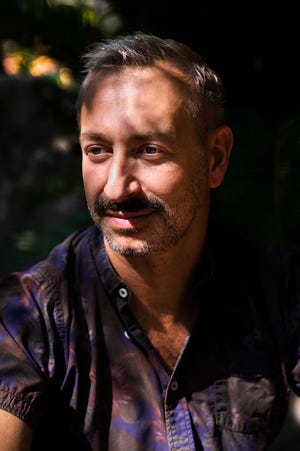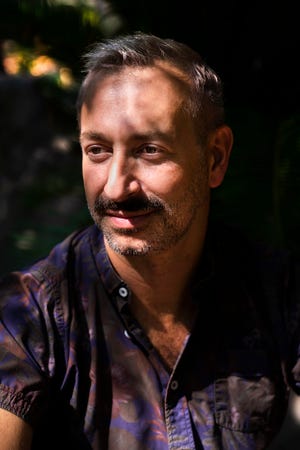At first, Alessandro Rugge was worried about a rash on his face that looked like razor burn. By the Fourth of July weekend, the Phoenix resident developed a 100-degree fever, chills and swollen nymph nodes throughout his body.
Rugge was mildly skeptical of the severity of the current global monkeypox outbreak, but the 51-year-old tech professional would test positive for the virus on July 6.
He made a full recovery after feeling ill for a few weeks. Since then, Rugge has aimed to educate fellow men who have sex with men, or MSM, about monkeypox since he felt it was hard to navigate through testing and treatment. Through Facebook posts, he has implored other MSM to take preventative measures like vaccination.
He also wants to warn about the broader implication of mischaracterizing the virus as a so-called gay disease.

“When we stigmatize, people go into the dark. And what that will cause, just like we saw with HIV, is that this disease coming out and propagating through other segments,” Rugge said in an interview with The Arizona Republic. “It’s important to focus the resources and the attention and the messages to where it is needed now, but at the same time we need to make sure that everybody — the general population — understand that this could impact them too.”
That urgency about educating the general public about the virus comes as President Joe Biden’s administration on Thursday declared monkeykpox a public health emergency with the aim of expanding vaccine availability.
Based on U.S. monkeypox case reports through July 27, the Centers for Disease Control and Prevention cited that men made up 99 percent of cases and that 94 percent of men with available information reported sexual or intimate contact with another man three weeks prior to experiencing symptoms.
As of Friday, the CDC has counted more than 7,500 cases of monkeypox in the U.S. in 2022. As of Friday, according to the Maricopa County Department of Public Health, there are 85 confirmed and probable monkeypox cases in the county. The Arizona Department of Health Services does not have a statewide accounting of monkeypox cases in Arizona.
FAQ: What to know about the monkeypox virus and how to get the vaccine
In Maricopa County, vaccines are currently limited to men or transgender women who have sex with men or have multiple or anonymous partners, anyone who shares a household with someone who has tested positive for monkeypox, lab workers dealing with monkeypox specimens and health care providers working at sexual health or STI clinics or who primarily serve LGBTQ patients.
Vaccines will be available 5 p.m. to 8 p.m. Monday at the Maricopa County Health Department’s immunization clinic at 1645 E. Roosevelt St. in Phoenix. No appointment is needed, but doses will only be administered to those eligible and as supplies last, the Health Department noted. Those interested in vaccine eligibility can fill out a county online form for updates.
Jynneos is one of three smallpox vaccines available for use against monkeypox and is the only one licensed by the U.S. Food and Drug Administration for use. It is administered in two doses. Following a second vaccine event on Wednesday, the county said it had administered just under 2,400 doses.
Ask us: What do you want to know about monkeypox?
A gay issue or a public health issue?
At the Southwest Center for HIV/AIDS at The Parsons Center for Health and Wellness in central Phoenix, Shane Barrera, 23, heads up the prevention team conducting free HIV and STI testing. Barrera has been fielding questions from patients about the virus and vaccine availability.
Barrera, who identifies as gay and got his first dose of the vaccine July 27 at a previous county health event, said he wants to underscore that the virus is not an STI and that its transmission occurs through skin-to-skin contact between people, regardless of sexual orientation.
“I think instead of making this a gay thing, we need to make it a public health thing in general and realize this could happen to anybody and it does happen to anybody,” Barrera said.
Journalist Hank Plante, 75, covered the HIV/AIDS epidemic in San Francisco for CBS affiliate KPIX. Plante, who thinks he may have been the country’s first openly gay TV reporter, sees some parallels between AIDS then and monkeypox now and their disproportionate impact on gay and bisexual men and other MSM.
Plante blames federal inaction to curb AIDS for homophobia within President Ronald Reagan’s administration. Pointing to New York Times reports of 20 million vials of the Jynneos vaccine held by the Strategic National Stockpile that spoiled in the past decade, Plante has a simpler explanation for what he deemed as the Biden team’s “unprepared” response to monkeypox.
“I don’t think the Biden administration is homophobic. I think it was just government ineptitude,” Plante said.
Plante said more U.S. officials should follow the lead of the World Health Organization, whose leader last week advised MSM to limit their sex partners. This, he said, is what San Francisco officials “had the guts to say” 40 years ago, adding that most epidemiologists agreed with this course of action then.
“It would be a disservice to not warn the gay community this is most prevalent in your community, our community,” Plante said. “Our first priority should be protecting the gay community.”
Without addressing any specific group, the CDC has advised people to avoid sex with those who disclose monkeypox symptoms.
Lifelong Phoenix resident Peter Moraga, 57, said he was hopeful the country learned from the perils of stigmatizing during the HIV/AIDS epidemic and hopes those attitudes would not repeat themselves with monkeypox.
Seeing an uptick in monkeypox cases among gay men and knowing that he and his husband of 10 years like frequenting summertime pool parties, the couple decided to get the first vaccine dose at Maricopa County’s July event.
Waiting in a long but briskly moving line of mostly men, the two saw many social acquaintances there. The following day, the two had dinner with a couple of friends who had also gotten their initial vaccine dose.
“They were happy to see us there as we were to see them there because we felt like we were taking control and ownership of our own health care, and we were responding to a possible breakout in the community. We were doing our part to try and mitigate that,” Moraga said.
Moraga heard of a friend whose boyfriend has come down with monkeypox. Rugge said he knows upward of 25 friends and acquaintances in the Valley who have been infected with monkeypox.
Rugge assumes he contracted the virus through a sexual encounter based solely on the reported spread among the community, but he isn’t sure of it.
Rugge had three lesions on his face with one inside his mouth and another on his lips, causing them to swell about four times their size. Though he has some minor facial scarring from the lesions and some discomfort from those that grew on his body, Rugge said his case was not as severe as some others he has heard about.
“Trust us who’ve gone through this, you don’t want this. Go out and get a safe vaccine as soon as you can get your hands on it,” Rugge said.
Reach breaking news reporter Jose R. Gonzalez at jose.gonzalez@gannett.com or on Twitter @jrgzztx.
Support local journalism. Subscribe to azcentral.com today.








